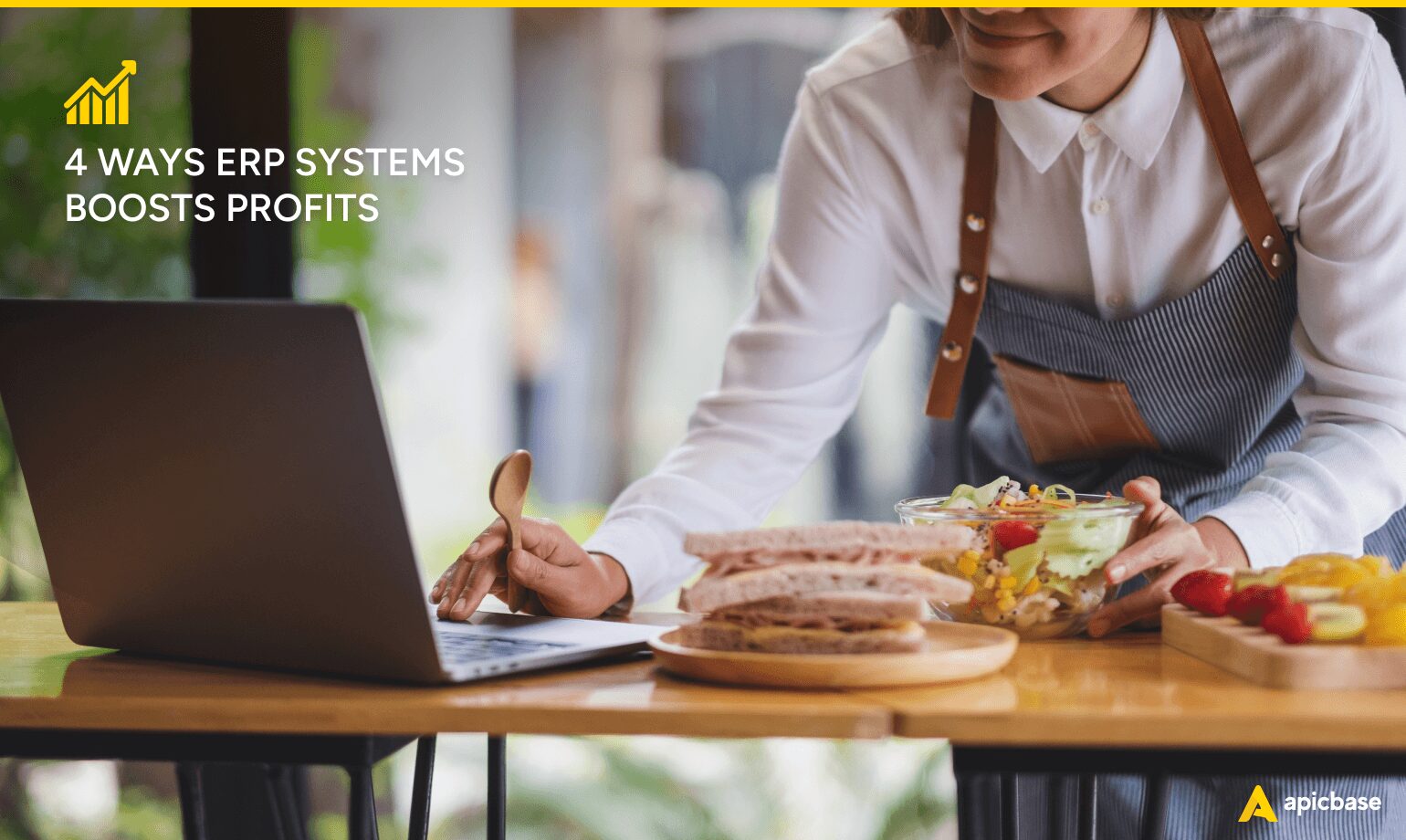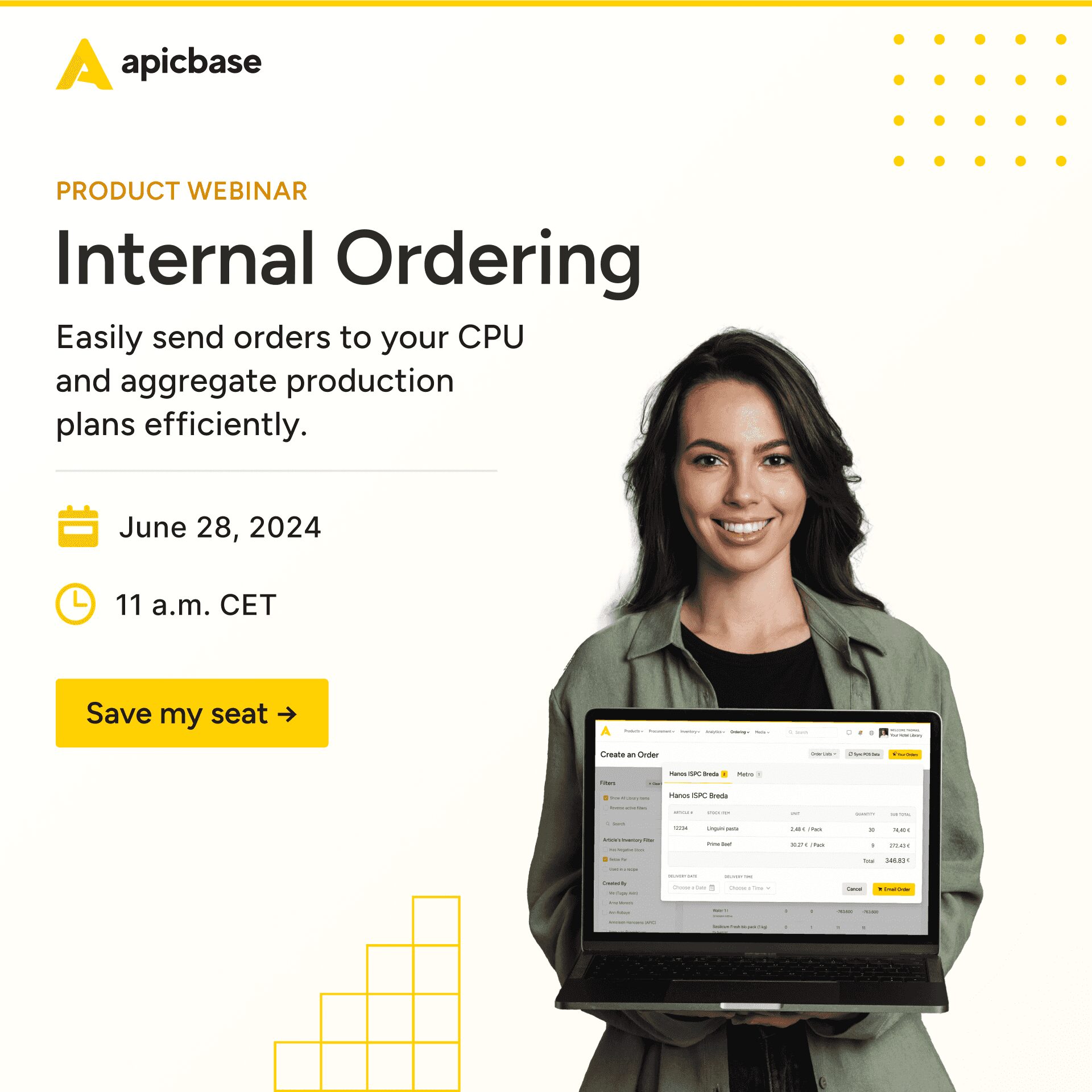The food and beverage industry is highly competitive. Controlling costs, improving efficiency, and maintaining an excellent customer experience are fundamental if you want to keep up with the competition and remain profitable.
ERP (Enterprise Resource Planning) systems are designed to manage all the functions of a large food service business. An ERP is a single system that stores all the data, automates tasks, and provides a management hub to make operations more efficient and easier to manage.
The best F&B ERP systems provide multiple functionalities that would otherwise be found in several ‘point’ systems. Point solutions have a narrower focus. They are designed to solve specific problems, for example, an online reservation tool.
ERP systems provide one holistic system to manage the whole business. Using a unified system is simpler and more efficient to manage, and reduces the risk of data being locked up in separate databases, the so-called data silos.
In this article, we explore the benefits of an ERP for F&B businesses, starting with the department-specific advantages, moving on to operational and financial benefits, and closing with suggestions for the best software on the market.
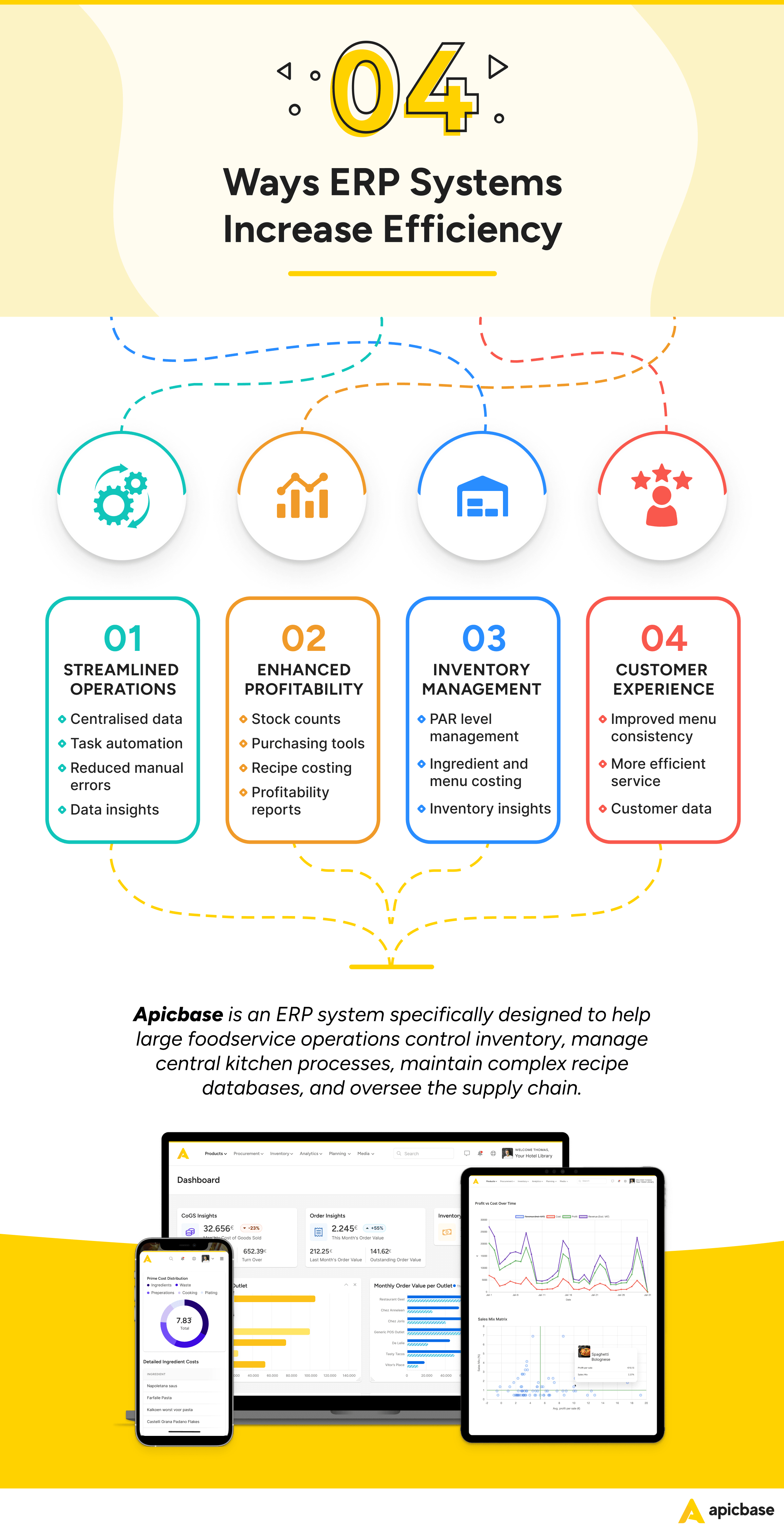
1. Streamlined operations for everyone
ERP systems are designed to improve efficiency across the organisation by centralising data, automating tasks, reducing the risk of manual errors, and providing real-time data visibility over multiple departments.
However, the best ERP systems have specific features within each department to make operations more efficient and management more effective. Let’s examine the department-specific benefits.
Finance and procurement
ERP systems help finance managers keep track of inventory and even automate tasks like creating purchase orders and logging invoices. The most advanced systems provide real-time pricing and cost tracking, which gives managers the most up-to-date and accurate data to make the right decisions.
The result is better budget management, less food waste, and lower ingredient costs, all while managers spend less time on manual tasks.
Operations and kitchen management
ERP systems store ingredient details and recipe data for easy access and enhanced planning. With tools for accurate recipe costing, production planning, and waste reduction, ERP systems help kitchen managers and operations managers more effectively plan ahead and control costs.
Executive chef and data analyst
Using real-time ingredient prices and enhanced menu development and optimisation features, F&B-specific ERP systems help head chefs and executive chefs create delicious, creative menus that are realistic to produce at scale.
They also provide data analysts with a single source of truth with the numbers and insights they need to ensure menus are as profitable as possible.
Tech leads
Having one single system to store and process restaurant data is the dream for your tech leads. It means data can be shared across the business securely, and insights are not lost in data silos. The whole business can communicate data effectively, improving efficiency in every aspect of operations.
2. Enhanced cost control and profitability
In F&B, controlling costs is the single most important factor if you want to be profitable. When you are on top of your purchasing and food costs calculations and know how much you’re spending, you can work to reduce costs without compromising quality.
ERP software comes with features designed to help F&B companies gain better control over spending. Here are the features to look out for:
- Real-time inventory tracking—a digital inventory management system speeds up stock counts and keeps control of inventory levels with real-time data. This helps managers keep tabs on inventory and reduce costs by minimising waste from overstocking and spoilage.
- Purchasing management tools—digital purchasing tools store all your vendor details in one place and have features to help you compare prices between vendors and negotiate prices to reduce costs.
- Recipe costing—ERP software can store detailed recipe data and automatically calculate the cost to produce a portion. The best systems have tools to analyse your recipe costing data to find opportunities to optimise recipes and cut costs without sacrificing quality.
- Real-time profitability reports – reporting dashboards that use real-time data help you track performance as it happens and identify areas to eliminate inefficiencies, reduce waste, and, as a result, reduce costs.
3. Improved inventory management
Better inventory management reduces waste and improves efficiency for F&B businesses. ERP systems store inventory data and provide real-time stock level information allowing managers to make more informed decisions.
Let’s have a look at how ERP systems improve inventory management for two types of F&B business.
For restaurants and dark kitchens
Restaurants and dark kitchens need to manage a high turnover of perishable items. ERP systems monitor stock levels and aid better inventory management with the following features:
- PAR (Periodic Automatic Replacement) level management – inventory management software helps you calculate optimum PAR levels, which tell you the amount of each item you need to fulfil demand. Using the PAR levels as parameters, the ERP generates purchase orders automatically. This system reduces waste and ensures you always have the ingredients you need to satisfy your customers.
- Ingredient and menu costing—ERP software calculates the cost of each menu item based on the real-time cost of ingredients. With accurate costs stored, the system helps prevent overstocking, which leads to waste and higher food costs.
- Real-time inventory visibility – real-time reports on stock levels help managers keep inventory at optimal levels and plan production schedules to eliminate the risk of menu items being unavailable.
For hotels and catering
Hotels and caterers have to deal with a more diverse range of ingredients that may be totally different from week to week. This makes managing inventory and controlling costs even more challenging.
Additionally, hotels tend to have complex operational structures, with large teams managing different aspects of the business. And where the F&B side is part of a larger organisational structure.
Catering companies often operate with little to no inventory between events, making managing inventory and reducing waste even more important and challenging.
An ERP system helps centralise management as much as possible to prevent data silos and miscommunication. Here are some features that help hotels and caterers solve complex inventory management problems.
- Event-specific inventory management – hotels often run multiple restaurants while also catering several events, large and small, across the span of each week. ERP software tracks inventory, creates production plans and purchase orders, and costs menus for specific events. Forecasting tools even help you plan your next week or month’s inventory needs with a visual event calendar.
- Recipe costing for catering menus and banquets—managing catering events and executing large banquet menus involves attending to large groups with diverse needs. ERP software provides recipe costing for complex menus with multiple dietary needs and helps you accurately plan menus for large numbers of people.
4. Strengthened customer experience
Aside from directly reducing waste and improving efficiency to bolster margins, F&B ERP systems also indirectly contribute to a better customer experience.
Here are some of the features of F&B ERP systems that improve the experience for customers at the point of service delivery.
- Improved menu consistency – ERP systems store recipe data in a standardised way no matter how many locations and sales channels your business has. They even have tools to optimise menus for the ideal mix of popular and profitable dishes. This means your menus are consistent and accurate no matter how the customer interacts with your restaurant, giving your customers a better experience whether they order online or sit down to eat in-store.
- More efficient service – with standardised recipes, better inventory management, and improved kitchen operations, ERP systems boost efficiency across the back of house. When the back-of-house is a well-oiled machine, it means items remain available, service is faster, and the front-of-house team members can perform their roles better. All of these factors lead to a better end experience for the customer – faster service with fewer errors and better quality food.
- Continuous improvement based on customer preferences – ERP systems store useful data not just about recipes and ingredients, but about customers and their preferences. The best systems analyse customer and restaurant data to come up with insights that help you better predict demand and offer targeted promotions.
Apicbase is your food and beverage ERP partner for growth
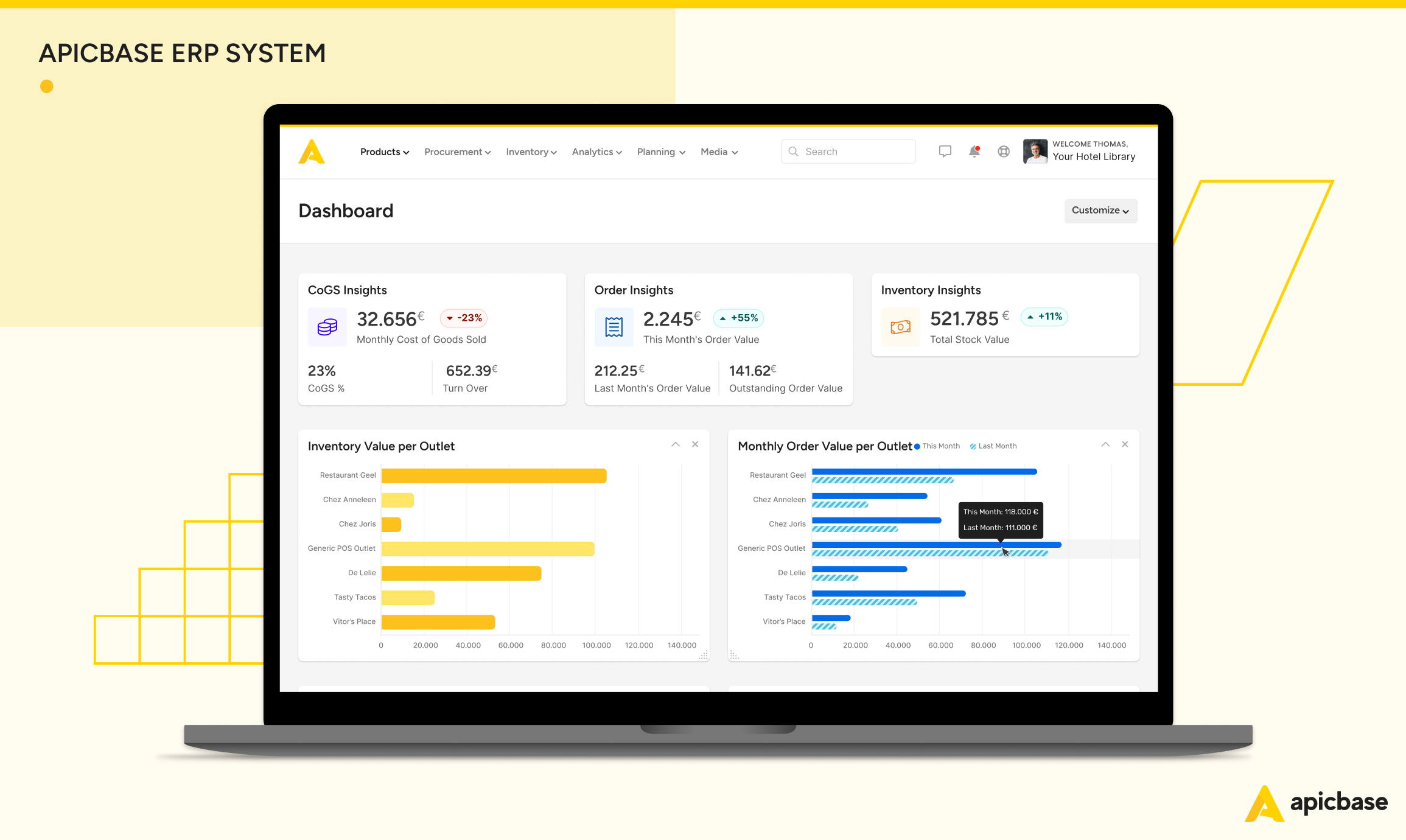
An F&B ERP system offers the key benefits of streamlined operations throughout the business, better cost control and profitability, improved inventory management, and an enhanced customer experience.
Apicbase is an ERP system specifically designed to help large foodservice operations control inventory, manage central kitchen processes, maintain complex recipe databases, and oversee the supply chain. Built for scalability, cloud-based accessibility, and role-based functionalities, It stands out as the best solution for ambitious, growing businesses that need solid functionality and flexibility.
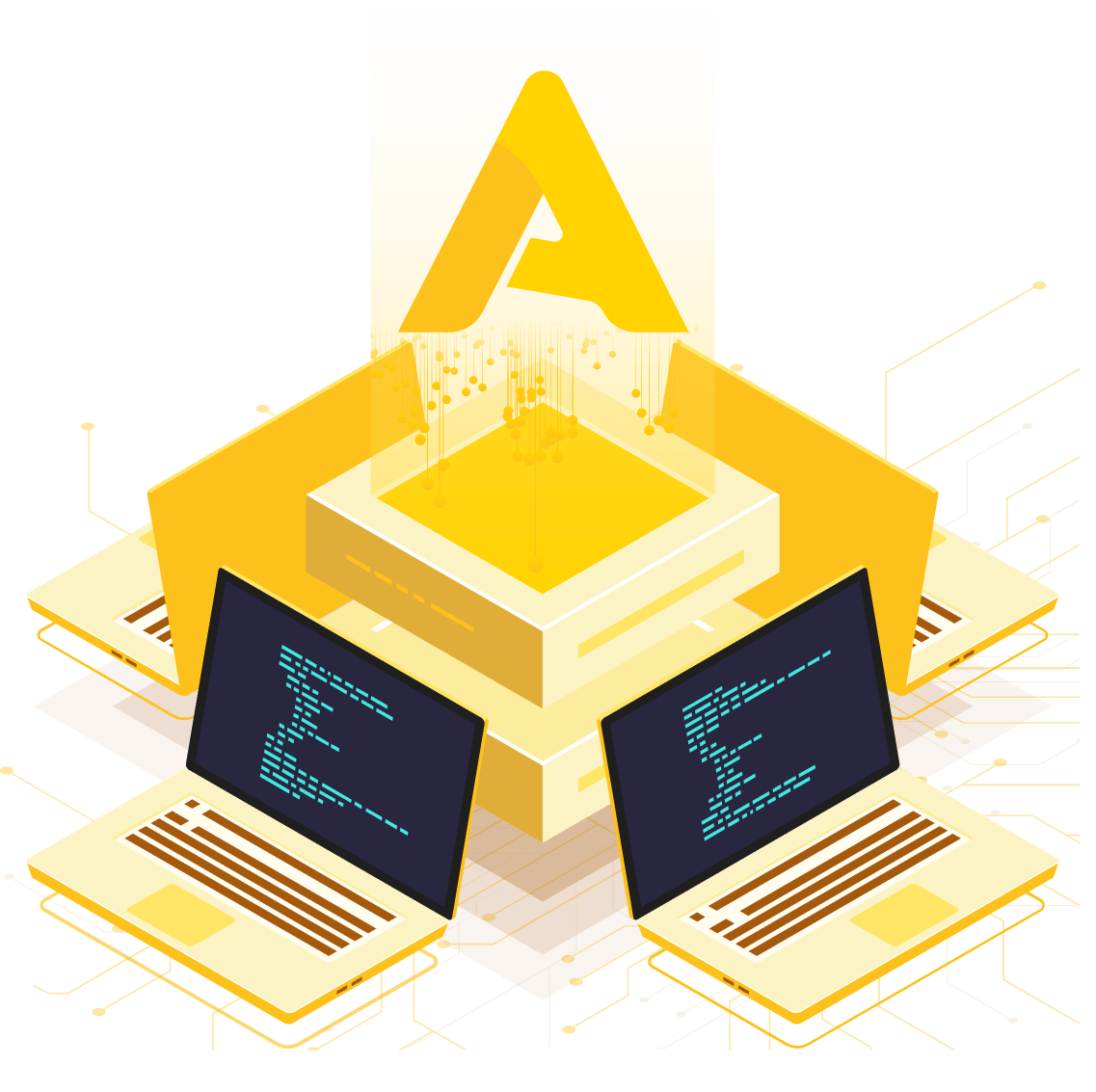
Time for Action
Learn more about our platform’s key features or book a demo to see Apicbase in action. 👇
